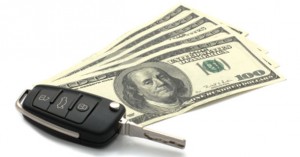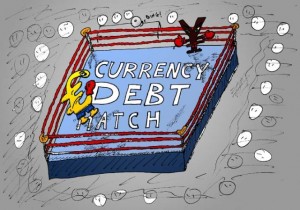December 13, 2012
 All businesses have overheads; those recurring costs that show up month on month. They may have little effect on the day to day running, but can have a huge impact on your bottom line. Careful monitoring will prevent overheads getting out of control and what better time than New Year, to re-evaluate the necessity of these costs and re-establish your values.
All businesses have overheads; those recurring costs that show up month on month. They may have little effect on the day to day running, but can have a huge impact on your bottom line. Careful monitoring will prevent overheads getting out of control and what better time than New Year, to re-evaluate the necessity of these costs and re-establish your values.
There are only two ways to get more money; sell more or cut back. Nobody likes the idea of a cut back, but sometimes in business it has to be done. Simply looking at alternatives to what you already have can help open your eyes to other sources of saving. Your office and your everyday tasks can be replaced to a more cost effective substitute like swapping travel with video calls.
Here are some tips that should help lessen the blow:
1. Evaluate your office – Look not only at the physical space with all its associated costs, but at the furniture and equipment within the space.
Either move to a less expensive office or look for shared or serviced offices to cut back on overheads. Even just trying to re-negotiate the cost of your current space could save you money (and the expense of moving).
Unused office furniture could be sold and equipment recycled – some stores may even give you money off new when you trade in your old hardware.
2. Update old Software – this is viewed as expensive; however, hiring the right person for the job will pay dividends. There is a plethora of open source software available that provide options you did not have or are currently paying for. Research here is essential to ensure you retain professionalism.
3. Stop traveling – meet up via high definition video calls instead. Not only is the software easy to use and allows for much more than just a phone call with pictures; it makes the collaboration of colleagues, clients and customers all over the world available at the drop of a hat.
This method of communication also opens the doors to be able to deal with more businesses that were previously not possible without travel. The use of desktop sharing and interactive whiteboards make it easy for those in different locations to have a productive meeting meaning the world suddenly becomes a lot smaller for your business.
4. Compare services – just like all the television adverts for your home, investigate fixed price deals or utilities, water coolers, printers and recycling. Providers do not want to lose your business, so it is within their interest to make sure you are getting the best deal – make sure you are on it.
It is easy to go on about how to save money, but there are also things you cannot afford to cut. Maintaining your loyalty both from employees and customers is essential if there is going to be a business at the end of the day. Employees will understand cutbacks – but not at their expense; avoid reducing pension contributions or festive bonus schemes – they may help you out in the short term, but not in the long.
New Year is a great time to look back at your achievements and set your goals for the year ahead. Making the most of what you have and looking for new ways to be innovative will not only make your business more frugal, but will open doors to new opportunities.
Tags:
Business,
Cash Flow,
financial planning,
Money Saving,
Official Matter
November 12, 2012
 The car rental market is saturated with providers, most of them above board and operating an ethical service but as with any industry there are some unethical firms out there looking to rip off their customers. We all hate additional charges, particularly if they are hidden from us and sprung on us at the last minute…so we’re giving you a heads up. Even if you use only the most reputable companies with the highest level of trust you can still be subject – legally – to these charges. View some examples you may not automatically think of below:
The car rental market is saturated with providers, most of them above board and operating an ethical service but as with any industry there are some unethical firms out there looking to rip off their customers. We all hate additional charges, particularly if they are hidden from us and sprung on us at the last minute…so we’re giving you a heads up. Even if you use only the most reputable companies with the highest level of trust you can still be subject – legally – to these charges. View some examples you may not automatically think of below:
Drivers licence
Many providers have limitations with regards to the type of licence you can use with substantial extra charges in place for customers without these specific pre-requisites. The number of points on your licence can be a factor (generally the rental companies want no more than 6), the duration for which you have had the licence is another factor with a year minimum seeming to be the requirement for an number of firms. Age is also a factor with service providers listing a minimum and maximum that they will accept – this is usually around a 21 year old minimum with a 75 year old maximum. Finally, the type of licence you hold is a factor with most providers only accepting full licences before they hand over the keys.
Amendments to booking
It’s common to incur charges for amending your booking at a later date – given that hiring a car is not a small cost though, if through carelessness or ignorance you do fall subject to some of these charges the cost to you can be significant compared with say, losing a restaurant reservation deposit, particularly if the hire is planned for a longer duration. Obviously in some situations things happen last minute which mean that you could not have cancelled the booking any sooner but as soon as you know you’re going to need to cancel, do it! Upon booking too it’s vital to check the time restrictions for cancellations as these can vary from firm to firm.
Out of hours
This is an understandable charge given that an out of hours service will incur significant additional costs to the provider, however it can be beneficial to be aware of any out of hours charges prior to booking. Perhaps it might not be that inconvenient to return the car those few hours earlier after all…
Other Extras
Travelling with children? Opting for a diesel car? Need a sat nav? These can all cost more depending on the provider you go with. Although these are all standard add-ons with many vehicles these days when renting, anything more than the norm (especially with the budget firms) will add on to that final price. In particular booster seats, baby seats and child seats all appear to be optional and require additional payment.
Area charges
As our final point let’s look at location-based charges. The congestion charge applicable to those vehicles driving into London is a good example of these – perhaps you could look at a hotel just outside of the charging zone if you are thinking about visiting and hiring a car in the capital! Also, one way rentals and renting in premium locations can hike up the price too.
Tags:
Car,
Car Renting,
financial planning,
Renting
November 8, 2012
 Investing in property has always been considered a safe and good long term investment. Investors consider investing in property as a safe bet. With a little planning and research, buying an apartment off the plan usually turns out to be a good investment. But there are some pros and cons that you should be aware of before investing in this venture.
Investing in property has always been considered a safe and good long term investment. Investors consider investing in property as a safe bet. With a little planning and research, buying an apartment off the plan usually turns out to be a good investment. But there are some pros and cons that you should be aware of before investing in this venture.
Benefits
Initial price:
You get the benefit of buying the apartment right of the drawing board. You pay the current price and not the price it’s expected to escalate to after completion. It’s very rare that an apartment bought of the plan does not increase in value.
Low capital outlay:
You just need to pay a maximum 10% of the agreed price to secure the apartment. This gives you enough time to plan your finances and arrange future payments.
Stamp duty saving:
Some state governments of Australia offer reduction in stamp duties and bonuses for buying off the plan. You can easily save thousands of dollars.
Choice of apartment:
Property developers give you a choice when buying off the plan. This means you get to choose an apartment with a garden, or one with the best view. You can also choose the interior, color of walls; fittings, etc.
Builders guarantee:
Brand new property in Australia has a 7 year builder’s guarantee. So you don’t have to worry about any structural or interior fault that might occur, as this will be fixed at no cost to the owner.
Increase in value:
Apartments tend to go up in value once they are completed and people start moving in. If the apartment building is in a good location, and well constructed the price is bound to increase. That’s when you can decide whether you want to hold on to it or put it up for sale.
Risks
Drop in property market:
Investing in any form always has a risk associated with it. The fear of a sudden drop in prices is one of the biggest fears that haunt investors.
Rising interest rates:
Interest rates might rise when the property is completed as the time lag between buying and the apartment being ready can vary between 6 months and 2 years.
Bankruptcy:
The developer may declare bankruptcy anywhere during the construction phase of the project. You must ensure that your risk is covered in case this happens. Get a solicitor to review the agreement to ensure that you are protected.
Not up to the mark:
What you envision and what you get can differ. This can happen if you are not very good at visualizing what to expect by looking at drawings. Or the developer fails to meet the standards of construction that you were expecting.
Before you sign the agreement
These are some steps that you must take before signing on the dotted line and handing over the check.
· Check out the developer’s reputation; financial position, and history.
· Scrutinize the plans; model, interior finishing, fittings, and fixtures.
· Visit the proposed site area and see if there are any other buildings coming up in the area.
· Research the property market in the area. Get to know current and future property trends of the area.
Tags:
Apartments,
financial planning,
Investors,
money,
Mortagage,
Property,
real estate
October 30, 2012
 Saving money on day-to-day expenditure is one thing, but reigning in your habits to save even more is another one of life’s challenges and involves taking account of your spending behaviour on things that you just don’t need.
Saving money on day-to-day expenditure is one thing, but reigning in your habits to save even more is another one of life’s challenges and involves taking account of your spending behaviour on things that you just don’t need.
Everybody has habits in life and there are always ways that you can use them less to save more money. Such spending habits include eating out, drinking (alcohol) and smoking.
There are so many people that refuse to cook in the home and so pay more for the likes of takeaways and meals in restaurants which can put a really stretch on their finances. Eating out should be a nice treat and not something that should be a common occurrence, unless you’re absolutely made of money.
It is so much cheaper to do a modest shop at the supermarket and begin cooking food at home to cut down the costs. Reserve one weekend of every month to treat you and your family to a night out and these nights out will feel special and can be something to look forward to, as opposed to ruining the effect with several each week.
Smoking is a habit that costs individuals not only their health, but also a ton of money. Those who are on about 40-60 cigarettes a day will be spending into the hundreds each week and so cutting down or dropping the habit completely will enable you to save bundles of cash.
An alternative if you’re struggling to quit completely is to switch from the conventional cigarette to electronic cigarettes. E cigarettes are made so that you don’t inhale of the chemicals of a standard cigarette and also help you save money, as they are reusable and so the need to keep buying cigarettes is removed.
If you buy Electronic Cigarettes from Freshcig.co.uk you’d be able to both rein in your spending, as well as increase your health along the way.
Drinking can also be an expensive and unhealthy habit to participate in. Alcohol is a massive expense to some, as they feel the need to always have some in one form or another in their fridge or wine rack.
Like eating out, having a good drink with friends or just as a reward after work should not be seen as a regular thing and should again be regarded as a treat.
If you are able to combine all of these, then you will be able to save a great deal of money and in some cases, enjoy a much healthier lifestyle.
Tags:
budgeting,
cash,
financial planning,
money,
Persoanl Finance,
savings,
Tips
 Look around, what do you see? I see a lot of people struggling with their finances. Did you know the fact that an average family’s income is lower than it was a decade ago? How is that to you? Doesn’t it seem at least a little unfair? It surely does to me. Unfortunately none of us have heard that prices got also lower. So how do people manage to survive these days? Most of them are really bad at money management. And you are absolutely right, it leads them to having a debt. Some even have up 10 debts same time. Is there anything possible to do with your debt? Go on reading and you may find some good solutions for you:
Look around, what do you see? I see a lot of people struggling with their finances. Did you know the fact that an average family’s income is lower than it was a decade ago? How is that to you? Doesn’t it seem at least a little unfair? It surely does to me. Unfortunately none of us have heard that prices got also lower. So how do people manage to survive these days? Most of them are really bad at money management. And you are absolutely right, it leads them to having a debt. Some even have up 10 debts same time. Is there anything possible to do with your debt? Go on reading and you may find some good solutions for you:
1. First of all, try to keep a track of your debts. Put everything on list to have a better visibility on what you are at right now.
2. Be realistic about your monthly budget. Always know how much you can afford to spend during next 30 days. This will help you to have a better understanding of your everyday expenses.
3. Your credit payments. Do not stick with minimum. I know that they say that it is better to make small payments then not making it all. This is true of course. But your goal is to forget your debt as a nightmare, that is why consider making even more cuts in your budget in order to increase your payments.
4. Limit yourself in spending. Pay with cash. You cannot pay with cash= You cannot buy this thing.
5. Have only 1 credit card. In case you have more, lock them somewhere or at least use the one that has the lowest interest rate.
6. Work on emergency funds. Learn to prioritize emergency cases.
7. This is the part where you will have to say good bye to your outdoors activities for a while. Eat in, invite your friends to watch movies at home, spend more time with your family. Do not imprison yourself, just try to be more rational with your entertainment. Do not turn to fast cash online only because all of your close friends are going to some interesting trip and you also feel like can’t miss this event. It’s not worth it.
8. Never give up saving. No matter how hard it is, keep on saving. Set a goal, have a rough plan and do not stop.
There are plenty of ways to help you either to avoid having a debt or maybe guide you through difficult financial times. It can get really tough sometimes; just remember that no one but you can help yourself. Be wise with your money and believe me, life will reward you!
Tags:
budgeting,
cash,
Debt Consolidation,
Debts,
economy,
financial planning,
money,
personal finance,
Problems
 All businesses have overheads; those recurring costs that show up month on month. They may have little effect on the day to day running, but can have a huge impact on your bottom line. Careful monitoring will prevent overheads getting out of control and what better time than New Year, to re-evaluate the necessity of these costs and re-establish your values.
All businesses have overheads; those recurring costs that show up month on month. They may have little effect on the day to day running, but can have a huge impact on your bottom line. Careful monitoring will prevent overheads getting out of control and what better time than New Year, to re-evaluate the necessity of these costs and re-establish your values.




Recent Comments